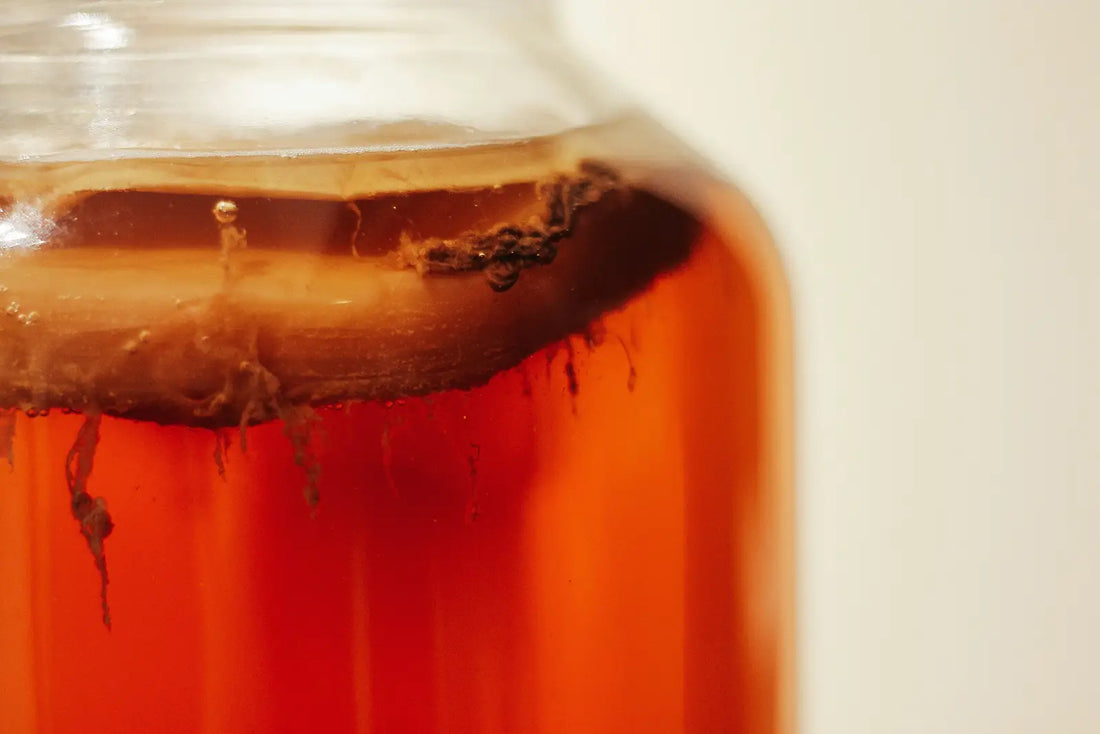
Does kombucha have alcohol?
Share
Author: Nick Nowak, PharmD, BCPS
What is Kombucha?
Kombucha, a fermented tea beverage, has garnered significant attention in recent years for its potential health benefits and unique taste. It's often praised for its probiotic properties and refreshing flavor profile, but one question that frequently arises is whether kombucha contains alcohol.
What is Alcohol?
Before delving into the alcohol content of kombucha, it's essential to understand what alcohol is. Alcohol, chemically known as ethanol, is a psychoactive substance produced through the fermentation of sugars by yeast.
The Fermentation Process
Kombucha undergoes fermentation, a process where microorganisms like yeast and bacteria metabolize sugars to produce various compounds, including alcohol and acids. During fermentation, yeast converts sugars into alcohol, while bacteria in the SCOBY (symbiotic culture of bacteria and yeast) further metabolize alcohol into organic acids.
- Role of Yeast and Bacteria: Yeast, such as Saccharomyces cerevisiae, is responsible for alcohol production, while bacteria like Acetobacter and Gluconacetobacter contribute to acid formation.
- Alcohol Production: Yeast consumes the sugars in the tea and produces ethanol as a byproduct.
Alcohol Content in Kombucha
Contrary to popular belief, kombucha does contain alcohol, albeit in varying amounts. The alcohol content in kombucha is a result of the fermentation process, where yeast converts sugars into ethanol.
- Factors Affecting Alcohol Levels: Several factors influence the alcohol content of kombucha, including fermentation time, temperature, and the ratio of yeast to bacteria in the SCOBY.
Regulation and Labeling
In many countries, including the United States, beverages containing more than 0.5% alcohol by volume (ABV) are subject to regulation by alcohol control authorities. As a result, kombucha producers are required to label their products with the alcohol content if it exceeds this threshold.
Health Implications
While kombucha is generally considered safe for consumption, it's essential to be mindful of its alcohol content, especially for individuals sensitive to alcohol or those avoiding it for health or religious reasons.
- Effects of Alcohol Consumption: Even though the alcohol content in most commercial kombuchas is relatively low, excessive consumption could lead to intoxication, especially in individuals with low alcohol tolerance.
- Alcohol Sensitivity: Some individuals may be more sensitive to alcohol's effects or may need to avoid it altogether due to medical conditions or personal preferences.
How to Reduce Alcohol Content
For those concerned about the alcohol content in kombucha, there are ways to mitigate it. Extended refrigeration or pasteurization can halt the fermentation process, reducing alcohol levels.
DIY Alcohol Testing
Alternatively, homebrewers can test the alcohol content of their kombucha using DIY methods, such as hydrometer readings or alcohol testing kits.
Alternatives to Traditional Kombucha
If you're looking for kombucha alternatives with lower or no alcohol content, consider exploring water kefir, a fermented beverage made from sugar water and kefir grains, or herbal teas like rooibos or hibiscus.
Conclusion
In conclusion, kombucha does contain alcohol, albeit in varying amounts depending on factors such as fermentation time and conditions. While the alcohol content in commercial kombuchas is generally low, it's essential to be aware of its presence, especially for individuals sensitive to alcohol or those with dietary restrictions.
FAQ about Kombucha
Does all kombucha contain alcohol?
Yes, since kombucha is a fermented beverage, it naturally contains trace amounts of alcohol.
What is the legal limit for alcohol in kombucha?
In many countries, including the United States, beverages containing more than 0.5% alcohol by volume are subject to regulation.
Can kombucha make you drunk?
While it's unlikely to become intoxicated from drinking kombucha, excessive consumption could lead to mild intoxication, especially in individuals with low alcohol tolerance.
How can I reduce the alcohol content in homemade kombucha?
Extended refrigeration or pasteurization can help halt the fermentation process, reducing alcohol levels.
Are there alcohol-free alternatives to kombucha?
Yes, water kefir and herbal teas like rooibos or hibiscus are popular alternatives with little to no alcohol content.
////
About the Author: Nick Nowak is a Doctor of Pharmacy (PharmD) and Board Certified Pharmacotherapy Specialist (BCPS. Nick studied at the University of Health Sciences and Pharmacy in St. Louis, and led clinical inpatient teams for the United States Air Force.
Please note: Intended for educational and informative purposes only and not intended to serve as medical or professional advice. For medical attention or advice you should consult your physician or other health care professional.
